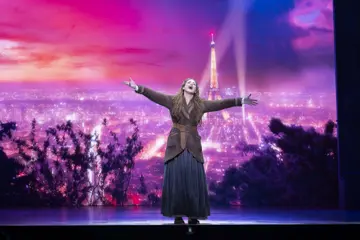Picnic At Hanging Rock is set in Victoria's Macedon region. On St Valentine's Day, 1900, a group from a prestigious ladies college journey to Hanging Rock to picnic. Three of the girls — including saintly Miranda — and their mathematics mistress vanish. The mystery subsumes the lives of all those connected to the day's events. Lindsay wrote her tome as if based on a true account — it wasn't. But Picnic At Hanging Rock is no sensationalised conceit.
"We've been approaching the work as a Greek chorus, in a way, trying to really conjure the language of the story..."
Melbourne actor Nikki Shiels — who, aside from starring in Neighbours as nurse Belinda Bell, has worked extensively on stage — viewed Weir's film, dipping into the book, while prepping for Patrick White's Night On Bald Mountain. She sought "to get the sense of the Australian Gothic and the annihilation of the Australian landscape in literature".
The roles in Picnic At Hanging Rock, directed by Malthouse Theatre's Matthew Lutton, are initially fluid. "It's very much an ensemble-driven piece. Tom's adaptation has remained very poetically rich and quite truthful to Lindsay's novel, but it is a play for five female Australian voices. There's quite a large amount of direct address. We've been approaching the work as a Greek chorus, in a way, trying to really conjure the language of the story and create nature through our voices and the words that Tom's written for us. But, as the production takes shape, we do each become inhabited by different characters and story lines through Lindsay's novel." Shiels "manifests" Irma, the solitary girl found, but who suffers amnesia.
Don't miss a beat with our FREE daily newsletter
There can be no Picnic At Hanging Rock spoilers as the mystery is never solved. This caused frustration, even furore, when Weir's film screened Stateside. Yvonne Rousseau's 1980 The Murders At Hanging Rock advanced the theory that two other picnickers — a visiting minor English aristocrat and stablehand — committed an elaborate rape and murder. "It is a thriller," Shiels responds. Lindsay's withheld final chapter, The Secret Of Hanging Rock, was published posthumously. However, with the author introducing the concept of wormholes, it's so surreal and speculative as to offer nothing tangible. Shiels laughs, "I've heard that it's got a very '70s vibe about it."
Like the novel, Wright's "horror" is existential and ambiguous. "The scariest thing I think is that there's no answer to the mystery!" Indeed, the play, picking up on Lindsay's fascination with temporality, rather "poses questions". "There's a huge theme of time in the novel and in Tom's adaptation — time and suspension and this idea of being on the precipice, being young, disappearing into a black hole, like [a] third dimension… What actually happens when time slows down? Does another reality occur? Is everyone experiencing the same thing? What does the rock contain? Does it contain time? What does time look like? It's all these kind of really philosophical and mysterious questions that in some way nature does hold the answers to and that we as humans can ever know."















